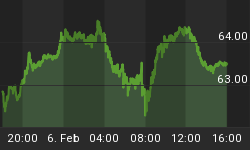Gold was money in the distant past and it will probably be money in the distant future, but there is no developed economy in which gold is money today. In this post I'll explain why.
People who argue that gold is money often confuse what should be with what is. They explain why gold-money would be vastly superior to any of today's fiat currencies and their explanations are probably 100% correct, but they are sidestepping the issue. There is no doubt in my mind that gold is far better suited to being money than something that can be created at whim by commercial banks and central banks, but the fact is that gold is presently not money.
Part of confusing what should be with what is sometimes involves the claim that governments can't determine what is and isn't money. This is akin to someone claiming it can't rain while standing in the middle of a rainstorm.
The hard reality is that governments routinely do many things that they shouldn't be able to do. Governments shouldn't be able to force people into slavery, but they sometimes do it. They call it conscription or the draft. Governments shouldn't be able to steal, but they do it on a grand scale every day and call it taxation. Governments shouldn't be able to monitor almost all financial transactions and most internet communications, but they do. They call it national security or keeping us safe from terrorists and drug traffickers. Governments, either directly or via their agents, shouldn't be able to siphon away the purchasing-power of savings and wages, but they do it under the guise of economic stimulus. Governments shouldn't be able to put obstacles in the way of peaceful, voluntary transactions, in the process greatly increasing the cost of doing business and thus reducing living standards, by they do it every day and call it regulation. One particular government (that of the US) shouldn't be almost continuously intervening militarily in multiple countries around the world, but it is. They call it peace through strength or keeping the world safe for democracy.
So, please don't insult my intelligence by asserting that governments don't have the power to determine what is money!
Another common mistake made by people who argue that gold is money is to emphasise gold's store-of-value (meaning: store of purchasing-power since value is subjective and therefore can't be stored) quality. However, there are many things that have been good stores of value that obviously aren't money, so acting as a store of value clearly isn't the defining characteristic of money.
Which brings me to a critical point: Before you can logically argue whether something is or isn't money, you must first have a definition of money. And since we are dealing with something that affects everyone, the definition must be practical and easily understood.
The only practical definition of money is: the general medium of exchange or a very commonly used means of payment within an economy. By this definition, gold is not money in any developed economy today. By this definition, the US$ is money in the US, the euro is money in the euro-zone, the Yen is money in Japan, the Australian dollar is money in Australia, etc.
Once something is the general medium of exchange it will generally be used as a unit of account. The unit-of-account function stems naturally from the medium-of-exchange function. Also, for something to be good money it should be a good long-term store of purchasing power, but, as noted above, being a good long-term store of purchasing power is clearly not the defining characteristic of money. Being a poor long-term store of purchasing power would almost certainly preclude something from being money in a free market, but we do not currently have a free market. Do not confuse what is with what should be!
Now, I acknowledge that it is possible to concoct definitions of money that lead to the conclusion that gold is money, but such definitions either aren't practical, or are focused on a characteristic of gold that is shared by some obviously non-monetary assets, or are simply wrong.
In conclusion, if something is money then the average person will know it is money because he will be regularly using it as a medium of exchange in his daily life. In other words, money cannot be a secret to which only an elite group is privy. Gold is therefore not money at this time. If it were, we wouldn't be in such a precarious economic situation.
So if gold isn't money, then what is it? That's an interesting question that warrants a separate post.















